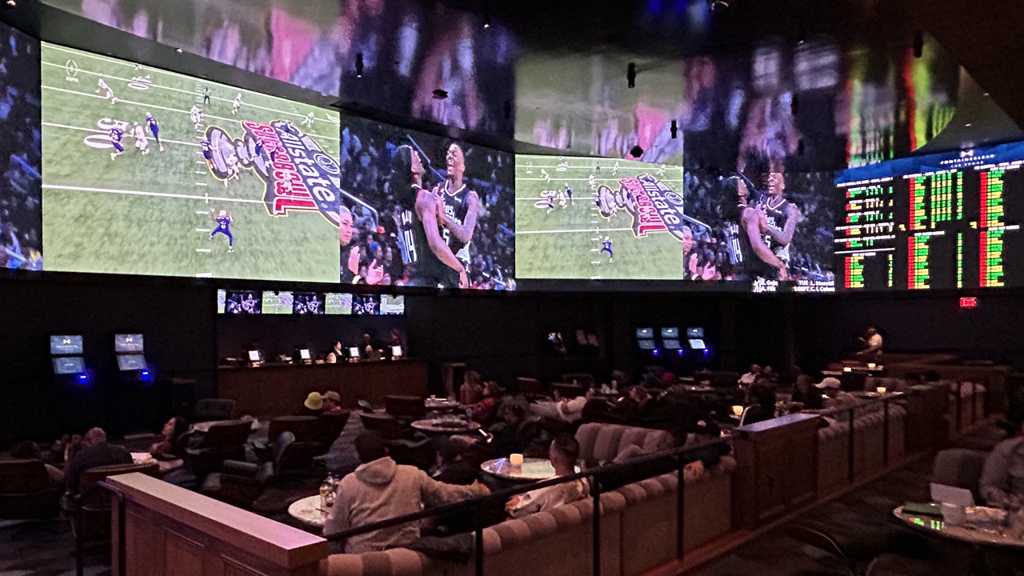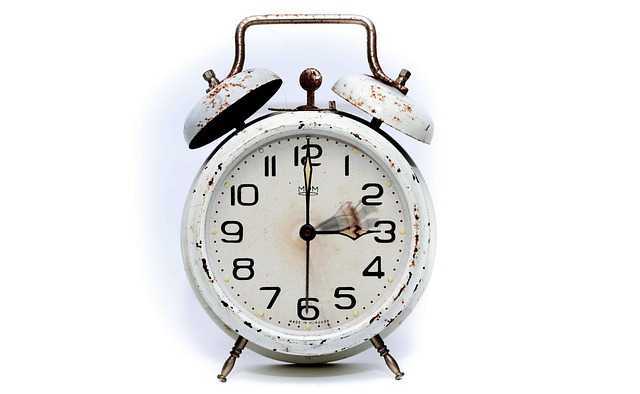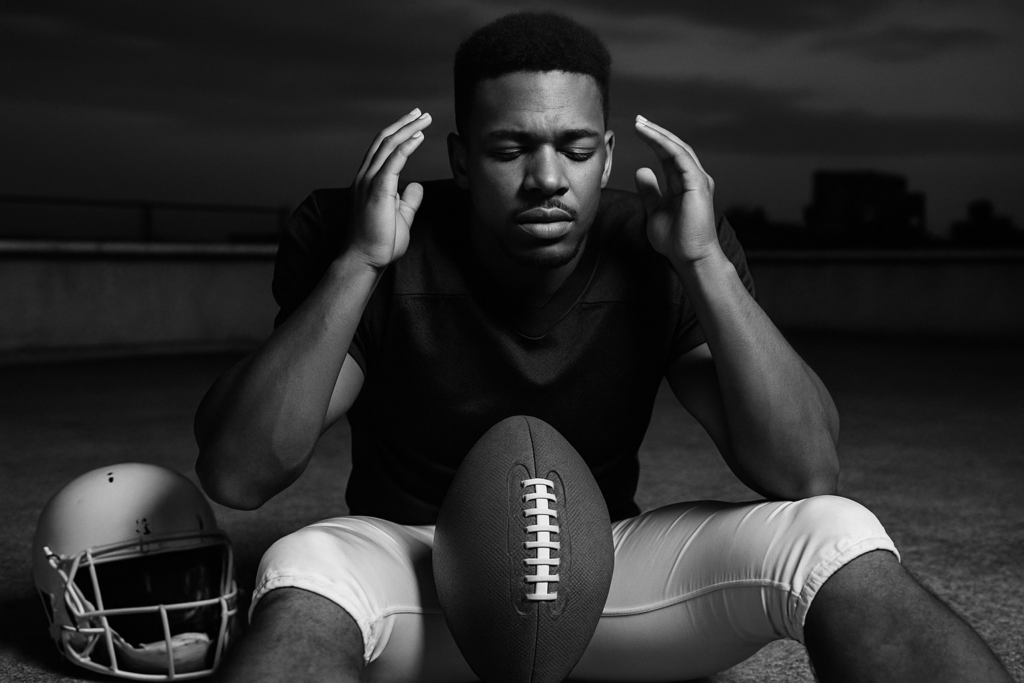Sports betting has been popular among Americans since the rise of spectator sports in late 1800s. But pro football has, historically, campaigned against it. Today, the NFL has official gambling sponsors, ball players are regularly snapped visiting casinos and the Super Bowl was held in Las Vegas. So, how did this happen?
Well, it’s a long story. One that involves the rise of the internet, a global pandemic and a landmark decision by the US Supreme Court. This, is how, and why, the businesses of sports betting and pro football put aside their differences to forge ties that are deeper than ever.
Prohibition and Opposition (1920s to 1980s)
Lotteries were common in the early American states. In fact they were highly encouraged by the powers that be. That was, before most gambling was largely outlawed in the 1800s due to a moral and religious backlash.
Sports betting first became big business in the US, mostly through horse racing, in the early 1900s. The emergence of spectating professional sports as a popular activity in the late 1920s, followed by the NFL in the 1950s, led to sporadic gambling bans in various states at various times.
If all this talk of sports betting just makes you want to have a gamble at the best online casinos real money can get you into, you’re in luck. Compare the top operators today, and find who has your new and old favorite games as well as top bonuses and promotions.
The famous 1919 Black Sox betting scandal in baseball, and the suspension of NFL stars Paul Hornung of the Green Bay Packers and Alex Karras of the Detroit Lions in 1963, were major inflection points in how sports leagues viewed betting at the time.
The NFL regularly and publicly condemned and campaigned against sports betting from its inception. Although it has since been revealed that, in the 1980s, the league did license satellite feeds of its games to Las Vegas casinos and their sportsbooks
The Federal Ban and the Online Black Market (1992 – 2018)
By 1992, the growth of gambling under the patchwork state of laws in the US was getting hard to ignore. The NFL and the National Collegiate Athletics Association, concerned about potential integrity concerns, were among dozens of sports leagues that lobbied the government for a federal ban on sports betting.
That year, Congress passed the Professional and Amateur Sports Protection Act (PASPA) which essentially outlawed sports betting across the US – except for states that had existing legal frameworks for it. Which was essentially Nevada only.
However, lawmakers failed to anticipate the rise of a transformational technology. The one you’re using right now, in fact.
The emergence of the internet in the early 1990s changed the game in terms of ease of access to online gambling. By the late 90s online sportsbooks based in places like Curacao and Costa Rica were illegally serving hundreds of thousands of American football bettors every weekend.
The Great Reversal and PASPA Repeal (2018 – 2020)
By 2018, the tide was becoming increasingly clear. Millions of Americans were betting on football online, and the government seemed powerless to stop them.
When New Jersey challenged PASPA in the Supreme Court, in 2018, the appetite for legal sports betting was undeniable. Although it was the NCAA that defended PASPA in court against New Jersey and its Governor Phil Murphy, the NFL did not officially take a stance on the case.
When PASPA was repealed as unconstitutional in 2018, New Jersey immediately sprang into action and legalized online sports betting. But few predicted what would come next.
Around half a dozen states had legalized sports betting by 2020, when most of the world was shut down for several months by the COVID-19 pandemic.
Among a raft of online businesses that benefited from billions of people being shut inside, especially once limited sports returned to TV, were online sportsbooks.
Increasing Ties and New Landmarks (2020 – 2025)
States suddenly deprived of tax revenues from all sources, looked enviously at New Jersey and its booming sports betting tax receipts – and decided they weren’t missing out.
By the end of 2021, more than 20 states had legalized sports betting. And pro football was watching. In April that year, the NFL announced its first ever direct sports betting partnerships – and a new era in football was ushered in.
2024 saw another landmark moment for football and sports betting’s burgeoning commercial relationship. Super Bowl LVIII was the first to be held in Nevada, long associated as the gambling capital of the US.
It was held at the Allegiant Stadium in Las Vegas – home to the Las Vegas Raiders since 2018 – and sports betting advertisement was all over the big event.
In 2024, the NFL also launched its own, official slot machine game. NFL Super Bowl Jackpot machines are available right now at casino floors across the US.
The 2025/26 season is predicted to see $35 billion wagered through legal US sportsbooks. The NFL also recently announced Paddy Power is to sponsor NFL broadcasts in the UK and Ireland, with more global gambling sponsors in the works.

 Chelsea Haynes is a valued member of the Awesome Football Network team, where she excels as a skilled contributor and article writer. With a sharp eye for detail and a deep love for football, Chelsea produces compelling content that covers a diverse range of topics, including team dynamics, player performances, and game strategies. Her insightful articles are crafted to engage and inform readers, providing them with a deeper understanding of the sport.
Chelsea's expertise and dedication to football journalism enhance the quality of content at Awesome Football Network. Her contributions help keep the platform at the forefront of football news, ensuring that fans and professionals alike stay well-informed and connected to the latest developments in the world of football.
Chelsea Haynes is a valued member of the Awesome Football Network team, where she excels as a skilled contributor and article writer. With a sharp eye for detail and a deep love for football, Chelsea produces compelling content that covers a diverse range of topics, including team dynamics, player performances, and game strategies. Her insightful articles are crafted to engage and inform readers, providing them with a deeper understanding of the sport.
Chelsea's expertise and dedication to football journalism enhance the quality of content at Awesome Football Network. Her contributions help keep the platform at the forefront of football news, ensuring that fans and professionals alike stay well-informed and connected to the latest developments in the world of football.
